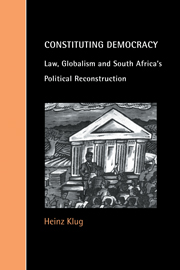Book contents
- Frontmatter
- Contents
- Acknowledgements
- Abbreviations
- Introduction
- 1 Post–Twentieth-Century Constitutionalism?
- 2 Legal Legacies and Constitutional Paths
- 3 Constitutionalism in Global Perspective
- 4 Constitutional Strategies
- 5 Constitutionalism in the Democratic Transition
- 6 Global Impact: International Imperatives and their Hybridization
- 7 The Constitutional Court and the Institutional Dynamics of Constitutionalism
- 8 Constitutional Imaginations and the Possibilities of Justice
- Conclusion
- Notes
- Bibliography
- Index
5 - Constitutionalism in the Democratic Transition
Published online by Cambridge University Press: 06 July 2010
- Frontmatter
- Contents
- Acknowledgements
- Abbreviations
- Introduction
- 1 Post–Twentieth-Century Constitutionalism?
- 2 Legal Legacies and Constitutional Paths
- 3 Constitutionalism in Global Perspective
- 4 Constitutional Strategies
- 5 Constitutionalism in the Democratic Transition
- 6 Global Impact: International Imperatives and their Hybridization
- 7 The Constitutional Court and the Institutional Dynamics of Constitutionalism
- 8 Constitutional Imaginations and the Possibilities of Justice
- Conclusion
- Notes
- Bibliography
- Index
Summary
Understanding the impact of globalization or international processes on the ‘internal’ dynamics that led to South Africa's constitutionalist shift does not however explain how such dominant international or global models are locally incorporated. Amidst the ideological celebration of markets, electoral democracy and justiciable rights – which were the products of the democratic transitions which dominated the last decade of the twentieth century – an open question remained as to the impact and sustainability of this newly globalized constitutionalism. While globalists of all stripes alternately celebrate, acknowledge or deplore the impact of global forces and developments on local or national possibilities, there is little discussion of how global models and norms play out in the local context. Exploring the interaction between global and local within the context of political reconstruction in South Africa, however, provides a way to explore the impact and incorporation of international political culture in a local context. By focusing on the dynamics of the constitution-making process as a particular source of pressures mediating the local incorporation of transnational norms, this chapter identifies the special role that constitutionalism may play in enabling a democratic transition.
In exploring this question, this chapter briefly considers what constitution-making options were available to South Africans, or argued for by the contending parties in the transition. Second, the chapter considers the relationship between the substantive aims of the different parties and the constitution-making processes they each advocated, as well as the role of political mobilization in either shaping debates or placing issues on the agenda at the negotiations.
- Type
- Chapter
- Information
- Constituting DemocracyLaw, Globalism and South Africa's Political Reconstruction, pp. 93 - 117Publisher: Cambridge University PressPrint publication year: 2000

